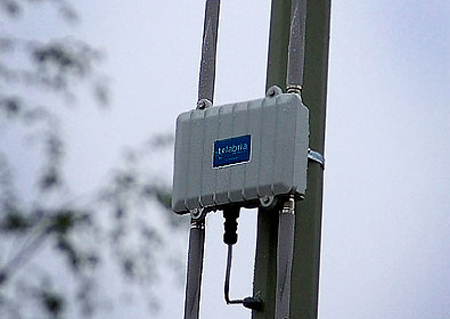Wi-Fi waves can harm children
Scientists worry that Wi-Fi transmitters can cause bad symptoms in children, such as headaches, dizziness, and insomnia.

A Wi-Fi transmitter in the UK.Photo: BBC
Digital Journal reported that students at Mountain View Primary School in Collingwood, Ontario, Canada suffered from headaches. Parents found that the high-capacity Wi-Fi system in the school could be the culprit. They asked the school to replace it with a lower-capacity system, and the system must be turned off when there is no user of the computer. However, their request was not made.
'Symptoms such as headache, dizziness, insomnia, heart palpitations have been recorded in 14 schools in Simcoe County, Ontario province since people installed Wi-Fi transmitters in the classroom' , Digital. The Journal quoted Susan Clarke, a researcher at Harvard Medical University, USA.
Parents have reason to worry. A report by the US Naval Medical Research Institute shows that powerful broadcast systems can cause many negative phenomena on the human body such as changes in body temperature, menstrual cycle, kidney function and speed. blood circulation.
Ms. Clarke was not the first to warn about the impact of Wi-Fi transmitters in the classroom. The People's Initiative once affirmed that children who are frequently present in an environment with electromagnetic radiation are at higher risk of illness than others because their immune systems are weakened.
The Guardian newspaper reported, the British government has asked the Health Protection Department to investigate broadcasting systems for computers. Investigators will explore the impact of wireless signals on students in the classroom for two years.
Dr. Gerd Oberfeld, director of the Environmental Health Agency of Salzburg, Austria, also said that Wi-Fi waves are dangerous.
'Wi-Fi in school is a weak microwave form. With a microwave, just close the lid so that the wave is locked in the oven. But in schools, waves are released into the environment , 'said Dr. Magda Havas, an expert at Trent University, Canada.
- Wifi waves cause cancer?
- Long-term harm when children sit a lot on a stroller
- 5 world famous girls thanks to simple experiments
- Wi-Fi waves are bad for trees
- Parents argue that they do not harm children
- Super waves appear more and more
- Freezing sea waves in the US
- The mystery of giant waves
- Strange children have 'dolphin eyes'
- Is the 5G network dangerous to human health?
- Wi-Fi waves are not harmful to health
- Terribly powerful monster waves buried ships in the ocean
 'Fine laughs' - Scary and painful torture in ancient times
'Fine laughs' - Scary and painful torture in ancient times The sequence of numbers 142857 of the Egyptian pyramids is known as the strangest number in the world - Why?
The sequence of numbers 142857 of the Egyptian pyramids is known as the strangest number in the world - Why? History of the iron
History of the iron What is alum?
What is alum? Is public Wi-Fi less secure?
Is public Wi-Fi less secure?  What does the name Wi-Fi mean?
What does the name Wi-Fi mean?  Here's everything you need to know about Wi-fi 7
Here's everything you need to know about Wi-fi 7  Things to know about Wi-Fi 6E coming soon
Things to know about Wi-Fi 6E coming soon  To make your home Wi-Fi better, turn off the microwave
To make your home Wi-Fi better, turn off the microwave  Wi-Fi 6E is about to dock: what does it mean for us?
Wi-Fi 6E is about to dock: what does it mean for us? 